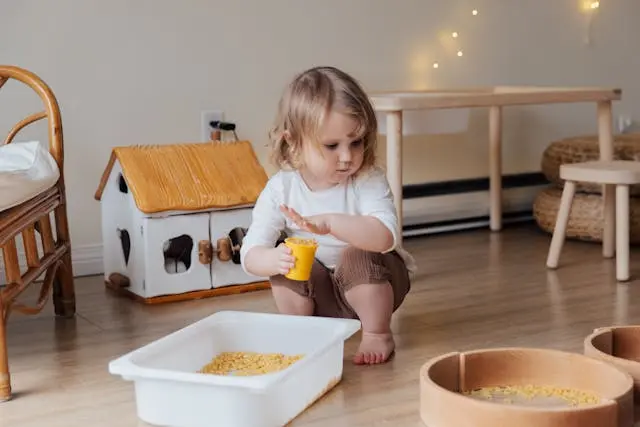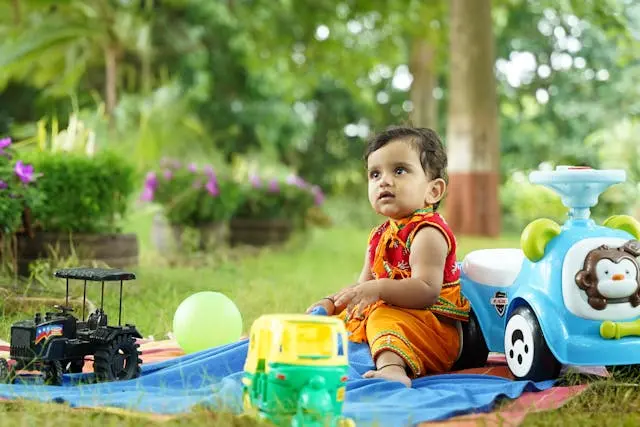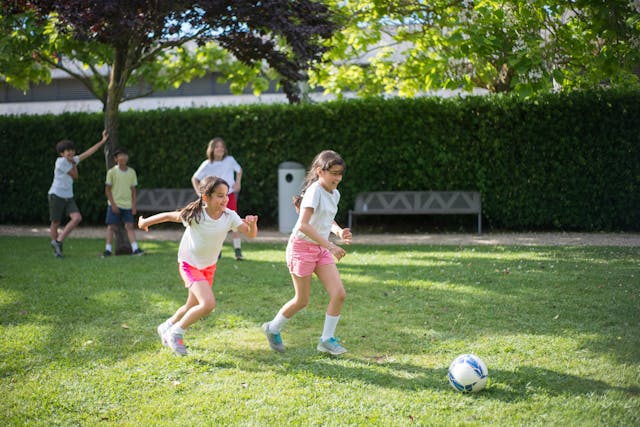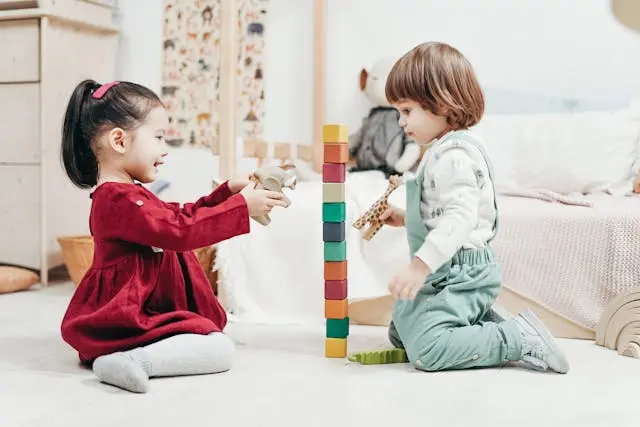The Ultimate Guide to Sensory Play for Infants
As both a preschool teacher and a mother, I’ve seen firsthand the remarkable impact that sensory play for infants can have on a child’s development. Sensory play involves activities that stimulate a child’s senses: touch, smell, taste, sight, and hearing. This form of play is not just about fun and games; it plays a crucial role in early childhood development. In this guide, we’ll explore the benefits of sensory play, why it’s important, and how you can incorporate sensory activities for infants into your daily routine.
What is Sensory Play?
Sensory play is any activity that engages your child’s senses. These activities help infants explore and make sense of the world around them. Sensory play can be as simple as letting your child feel different textures, listen to various sounds, or explore different scents and tastes.
Examples of Sensory Activities for Infants:
- Tactile Play: Letting your infant feel various textures like soft fabrics, rough surfaces, or squishy toys.
- Auditory Play: Playing different types of music, nature sounds, or household noises.
- Visual Play: Showing your baby contrasting colours and shapes.
- Olfactory Play: Introducing your baby to different scents like lavender, vanilla, or citrus.
- Gustatory Play: Allowing your infant to taste safe, age-appropriate foods.
Benefits of Sensory Play for Infants
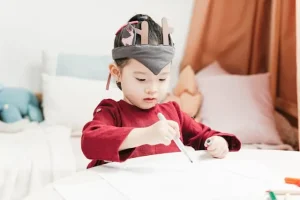
The benefits of sensory play are vast and impactful. Sensory activities for infants support cognitive, physical, and social development.
Developmental Benefits:
- Cognitive Development: Sensory play helps build nerve connections in the brain’s pathways, which is essential for learning complex tasks. For example, when an infant explores the texture of a toy, they are developing their sense of touch and learning about cause and effect.
- Motor Skills: Engaging in sensory activities helps infants develop both fine and gross motor skills. Manipulating objects improves hand-eye coordination and dexterity.
- Emotional Development: Sensory play can have a calming effect on infants. Activities like playing with water or sand can help soothe a fussy baby.
Social Benefits:
- Interaction: Sensory play often involves interaction with caregivers or other children, promoting social skills and bonding.
- Communication: Engaging in sensory activities can encourage infants to express themselves through gestures, sounds, and eventually words.
As a preschool teacher, I’ve seen children who engage in regular sensory play exhibit more curiosity, problem-solving skills, and confidence in their abilities. As a mother, I’ve found sensory play to be an excellent way to bond with my child and observe their growth and learning.
Why Sensory Play is Important
Sensory play is more than just a fun activity; it’s a vital component of early childhood development. Here’s why sensory play is important:
Enhancing Brain Development: Sensory play helps build neural connections that support thought processes, understanding, and reasoning. This is crucial for language development and cognitive growth.
Encouraging Exploration and Curiosity: Sensory activities for infants encourage them to explore their environment. This natural curiosity helps them learn about their world and fosters a love for discovery.
Building a Strong Foundation for Learning: Sensory play lays the groundwork for future learning. It helps children develop critical thinking skills, memory, and the ability to focus. These skills are fundamental for academic success later in life.
Types of Sensory Activities for Infants
Tactile Activities (3-6 months):
- Textured Balls: Allow your infant to explore balls with different textures.
- Sensory Bins: Fill a bin with various materials like rice, beans, or pasta for your child to touch and manipulate.
Auditory Activities (3-9 months):
- Musical Instruments: Let your baby play with simple instruments like maracas or drums.
- Sound Bottles: Create bottles filled with different items like beads or rice that make various sounds when shaken.
Visual Activities (3-6 months):
- High-Contrast Books: Use books with high-contrast images to stimulate your infant’s vision.
- Light Play: Shine a flashlight on the wall and move it around for your baby to follow with their eyes.
Olfactory Activities (6-12 months):
- Scented Playdough: Make playdough with different scents like lavender or peppermint.
- Herb Exploration: Introduce your baby to the scents of different herbs like basil, mint, or rosemary.
Gustatory Activities (6-12 months):
- Tasting Safe Foods: Allow your infant to taste different pureed fruits and vegetables.
- Flavor Ice Cubes: Freeze small amounts of pureed fruit into ice cubes and let your baby explore the flavours as they melt.
DIY Sensory Play Ideas
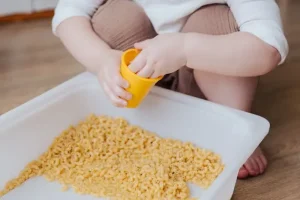
Creating sensory play experiences at home doesn’t have to be complicated or expensive. Here are some DIY infant sensory ideas that are simple and effective:
Homemade Sensory Toys and Materials:
- Sensory Bottles: Fill plastic bottles with water, glitter, beads, or small toys. Seal the bottle tightly and let your baby explore.
- Texture Boards: Attach various materials like sandpaper, fabric scraps, and bubble wrap to a board for your child to feel.
Step-by-Step Guides to Creating Sensory Play Setups:
- Water Play Station: Fill a shallow basin with water and add cups, spoons, and floating toys. Always supervise closely.
- Sand Play: Fill a container with sand and add small toys or natural objects like shells and rocks for your child to discover.
Safety Tips and Precautions:
- Always supervise your infant during sensory play to ensure they don’t put small objects in their mouth.
- Use non-toxic materials and avoid items that could pose a choking hazard.
- Keep play areas clean and hygienic to prevent the spread of germs.
How to Integrate Sensory Play into Daily Routines
Incorporating sensory play into your daily routine can be easy and beneficial. Here are some tips:
Incorporating Sensory Activities into Everyday Tasks:
- Bath Time: Use different textured sponges or add a few drops of baby-safe essential oils to the bathwater.
- Mealtime: Let your baby touch and explore their food. Offer a variety of textures and flavours.
Creating a Sensory-Friendly Environment at Home:
- Designate a Sensory Play Area: Set up a corner with soft mats, cushions, and a variety of sensory toys.
- Rotate Toys and Materials: Keep things fresh by regularly rotating the sensory toys and materials available to your child.
FAQs
Q: What if my baby doesn’t seem interested in sensory play?
A: Every child is different. Try different activities to see what captures their interest. Be patient and give them time to explore at their own pace.
Q: How often should I engage my baby in sensory play?
A: There’s no set rule, but incorporating baby sensory activities daily can be beneficial. Even short sessions can have a positive impact.
Q: What if my baby has a sensory processing disorder?
A: Consult with a paediatrician or occupational therapist for personalized guidance. They can recommend specific activities that may be beneficial.
Q: Are there any risks associated with sensory play?
A: As long as you supervise your child and use safe, age-appropriate materials, sensory play is safe and highly beneficial.
Conclusion
Sensory play for infants is a powerful tool for promoting early development. By engaging your child in sensory activities, you’re helping them build crucial skills, explore their environment, and develop a foundation for future learning. As both a preschool teacher and a mother, I’ve seen the incredible benefits of sensory play firsthand. I encourage you to incorporate sensory play into your daily routine and witness the positive effects on your child’s growth and development. Sensory play isn’t just important; it’s essential for nurturing a curious, confident, and capable child.
Written by: Maryam
Preschool teacher and expert in early childhood
BA Early Childhood Education with Psychology

